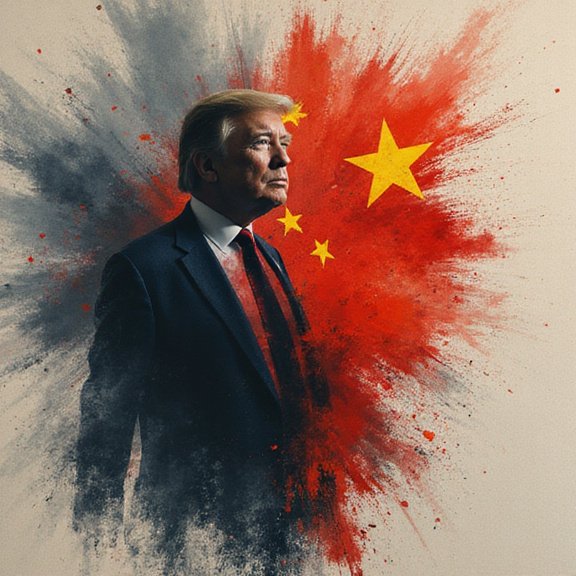The Unexpected Twist in China-US Relations: Trump’s Game-Changing Bombshells
Imagine waking up one morning to find that everything you thought you knew about a fragile peace has changed overnight. That’s how millions felt as they learned about the recent developments in China-US relations—a relationship already fraught with complexities and challenges. You may not be a political expert, but you understand the importance of stability in international relations, particularly between these two global powerhouses.

You’ve seen how trade tensions affect not only the stock market but also the prices of everyday goods. It’s a story that hits closer to home than you might initially think. Picture this: your weekly grocery bill rising and the cost of electronics shooting up, all due to political moves made thousands of miles away. It’s a reality many of us face when global diplomacy takes unexpected turns.
Yet, such is the nature of international diplomacy—a chess game with real-world implications. You might remember a time when you thought a disagreement had been settled, only for an unexpected revelation to send shockwaves through your plans. In a similar vein, the world watched in anticipation as China and the US seemingly reached a truce, only to be taken aback by Trump’s bombshell announcements that shifted the narrative dramatically.
In this article, you’ll delve into the intricacies of these political maneuvers, the economic implications of Trump’s bombshells, and the broader impact on global diplomacy. By the end, you’ll have a clearer understanding of how these developments affect not only nations but individuals like you. Join us as we explore this pivotal moment in international relations.
The Precarious Balance: Understanding China-US Relations
A Historical Overview of Trade Tensions
Trade tensions between China and the US are far from a new phenomenon. Over the years, the two nations have engaged in a back-and-forth of tariffs and negotiations, each trying to protect their economic interests. Historically, these tensions stem from issues such as intellectual property rights, currency manipulation, and market access. Understanding this history is crucial to grasping the current state of affairs.
The Fragile Truce: What Was Achieved?
The period leading up to Trump’s bombshells saw a tentative truce established between China and the US. This agreement, known colloquially as the “Phase One” trade deal, aimed to reduce tariffs and increase China’s purchase of American goods. While it was a step towards de-escalating tensions, many experts viewed it as a stopgap measure rather than a comprehensive resolution.
The Role of International Diplomacy
- Diplomatic efforts involve complex negotiations and mutual concessions.
- Both nations have engaged in dialogues facilitated by international bodies like the WTO.
- These diplomatic efforts aim to prevent escalation into a full-blown trade war.
Trump’s Bombshells: The Game-Changing Announcements
The First Bombshell: Targeting Technology
One of Trump’s significant announcements involved imposing restrictions on Chinese technology firms. This move was primarily aimed at curbing China’s influence in the tech sector, citing national security concerns. The implications of this decision reverberated throughout the global technology market.
The Second Bombshell: Tariff Changes
In another unexpected move, Trump announced changes to tariff policies that caught many by surprise. These revisions targeted a wide range of imports, further complicating the trade landscape. Businesses worldwide had to scramble to adjust their strategies in response.
The Immediate Political Impact
The bombshells sent ripples through political corridors globally. Allies and adversaries alike reassessed their strategies, while businesses braced for potential financial impacts. This situation underscored the interconnected nature of global politics and economics.
The Economic Implications of Trump’s Decisions
Impact on Global Markets
Trump’s announcements had immediate effects on global financial markets. Stock indices experienced volatility as investors reacted to the potential for increased trade barriers. The uncertainty created by these decisions reflected in fluctuating market sentiments.
Business Adjustments and Reactions
Businesses worldwide, particularly those operating in China and the US, faced a new set of challenges. Companies had to reassess supply chains, renegotiate contracts, and consider the viability of different market strategies.
Consumer Consequences
- Price increases on imported goods were anticipated, affecting consumer spending.
- Uncertainty in the market led to cautious consumer behavior.
- Long-term implications included shifts in purchasing habits and brand loyalty.
International Diplomacy in the Wake of the Bombshells
Reactions from Global Leaders
International leaders responded with a mix of caution and criticism. While some supported the US’s stance on intellectual property and security, others warned against the economic ramifications of escalating trade disputes.
Diplomatic Channels and Negotiations
Diplomatic channels became increasingly active as nations sought to mediate potential conflicts. Both bilateral and multilateral discussions aimed at finding common ground and preventing further escalation were prioritized.
The Role of Multilateral Organizations
Organizations such as the World Trade Organization (WTO) played a vital role in facilitating dialogue. Their involvement was crucial in maintaining a semblance of order amid the potential for widespread trade disruptions.
The Broader Political Impact of US-China Tensions
Shifts in Global Alliances
The dynamics of global alliances shifted as countries realigned their foreign policies in response to US-China tensions. Nations sought to strengthen regional partnerships and diversify their economic dependencies to mitigate risks.
Implications for Global Governance
- US-China relations influenced the decision-making processes in international bodies.
- Discussions around trade policies became central topics in global forums.
- The need for reformed global governance structures came to the forefront.
Long-Term Impact on International Relations
The repercussions of these tensions extended beyond immediate economic impacts. They posed challenges to the long-term stability of international relations, influencing diplomatic strategies and global power balances.

Frequently Asked Questions
How did Trump’s bombshells affect China-US relations?
Trump’s bombshells introduced new tensions into China-US relations by disrupting the fragile truce that was previously in place. The unexpected announcements regarding technology restrictions and tariff changes heightened uncertainty, prompting both nations to reassess their diplomatic and economic strategies. This led to renewed negotiations and increased volatility in international markets.
What are the economic implications of the trade tensions?
The economic implications of the trade tensions include market volatility, disruptions in global supply chains, and increased costs for consumers. Businesses faced challenges in adjusting their operations and strategies, while consumers experienced price hikes on imported goods. These tensions also influenced global investment decisions and economic growth projections.
How do trade tensions impact international diplomacy?
Trade tensions significantly impact international diplomacy by affecting bilateral and multilateral relationships. Countries often engage in diplomatic negotiations to mitigate conflicts and seek resolutions. The tensions also serve as a catalyst for discussions on global trade policies and the need for more comprehensive international agreements to ensure economic stability.
Why were Trump’s announcements considered bombshells?
Trump’s announcements were considered bombshells due to their unexpected nature and significant impact on global trade dynamics. The decisions to impose technology restrictions and alter tariffs were major shifts from previous negotiations, catching many stakeholders off guard and prompting immediate reactions from governments and businesses worldwide.
What role do multilateral organizations play in trade disputes?
Multilateral organizations like the WTO play a crucial role in trade disputes by providing a platform for negotiation and dispute resolution. They help mediate conflicts, offer guidelines for fair trade practices, and promote dialogue among nations. In the China-US tensions, such organizations strive to balance competing interests and maintain global economic stability.
How can businesses adapt to changing trade policies?
Businesses can adapt to changing trade policies by diversifying their supply chains, exploring new markets, and staying informed about policy changes. Flexibility and strategic planning are key to mitigating risks associated with trade disruptions. Companies may also invest in localizing production and enhancing their competitive advantage to remain resilient.
What is the significance of the Phase One trade deal?
The Phase One trade deal was significant as it represented a temporary easing of trade tensions between China and the US. It included commitments from China to increase purchases of American goods and some tariff reductions. However, it was viewed as a preliminary agreement, leaving many underlying issues unresolved and requiring further negotiations.
How do political decisions influence consumer behavior?
Political decisions, such as changes in trade policies and tariffs, can directly influence consumer behavior by affecting prices and availability of goods. Consumers may alter their spending habits, delay purchases, or switch brands in response to price changes. Uncertainty in the market also leads to cautious consumer confidence, impacting economic activity.
Conclusion: Navigating the Uncertainty and Moving Forward
As you navigate the intricate web of international relations, understanding the implications of political decisions becomes increasingly relevant. The bombshells dropped by Trump in the midst of a China-US truce remind us of the delicate balance of diplomacy and the far-reaching consequences of policy changes. These decisions affect more than just governments; they ripple through economies and societies, touching the lives of individuals around the world.
Your role, as a global citizen, involves staying informed and adapting to changes in this dynamic landscape. By recognizing the interconnectedness of global economies and the significance of diplomatic efforts, you can better prepare for the impacts these decisions may have on your daily life. Engaging in discussions, supporting policies that promote stability, and advocating for transparent governance are ways you can contribute to a more balanced and fair international system.
We invite you to continue exploring these topics and join the conversation on shaping a world where diplomacy triumphs over discord. Stay informed, stay engaged, and together, let’s navigate the complexities of our global community.
Key Takeaways
- China-US relations are characterized by a history of trade tensions and negotiations aimed at balancing economic interests.
- Trump’s unexpected announcements regarding technology restrictions and tariff changes disrupted the fragile truce between the two nations.
- The economic implications of these decisions are far-reaching, affecting global markets, businesses, and consumers.
- International diplomacy plays a crucial role in mediating trade disputes and maintaining global economic stability.
- Understanding the broader political impact of US-China tensions is essential for navigating the complexities of international relations.








